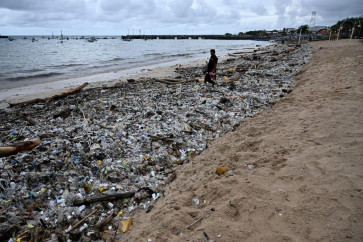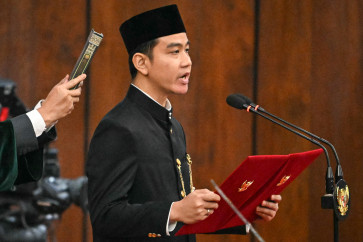Cooking shows reach new heights
Enjoying food in a natural setting at Harmoni Alam (Nature’s Harmony) cooking show, aired by Trans TV television station
Change text size
Gift Premium Articles
to Anyone

E
span class="caption" style="width: 378px;">Enjoying food in a natural setting at Harmoni Alam (Nature’s Harmony) cooking show, aired by Trans TV television station. Courtesy of TransTV
Culinary shows may be one of the most popular television programs now, feeding people’s desire to learn new recipes and cooking techniques.
Culinary programs have reached home in the past few years, with dozens of television channels and cables airing the shows each day.
Bondan Winarno’s Wisata Kuliner (Culinary Journey), aired on the private Trans TV television, helping grows the culinary show’s popularity through his adventurous trips tasting different local offerings both at restaurants and culinary hubs across the country.
The show’s success was soon followed by similar programs on other television stations, which helps put the country’s culinary offerings in the spotlight.
After indulging TV viewers and food lovers with culinary trip shows, the trend seems to be shifting to cooking shows themselves.
Unlike in the past, when cooking shows only captured a chef cooking in a sophisticated kitchen, the latest show offers a modern atmosphere with fun yet entertaining concepts.
Take Harmoni Alam (Natural Harmony), which takes the concept of a traveler cooking in picturesque outdoor areas, creating dishes made of ingredients found in locations where the shooting process takes place.
Chef Ari Galih, who used to work at some restaurants and a five-star hotel in Jakarta, is dubbed the current host. In the show, the host cooks without even using a table or stove, such as the episode shot in Linow Lake in North Sulawesi’s Manado, where he uses hot water from the lake.
In the beginning, Ari confessed he was not comfortable with the approach, saying the program, aired on Trans TV, did not allow him to cook properly — like on a moving boat or a slant rock.
“But in the end, I think this is a unique program because basically we can cook anywhere using what nature provides,” Ari said.
As shown in the show, the location does not limit Ari’s creativity in creating fancy food, usually served in hotels and posh restaurants, but in a much simpler way.
The biggest challenges are when the crew encounters bad weather, especially rain, which often postpones the filming schedule, and ensures hygiene.
Ari said the most dangerous thing in cooking was improper treatment of meat or poultry, not the fact that the chef had to cook on the ground.
“If, for instance, you use the same cutting board to cut veggies after using it for raw meat, that is dangerous because it will lead to cross-contamination,” he says. 
Another cooking show -- Kungfu Chef – has the chef cooking while moving like a martial arts master.
“We picture the chef as a kungfu master, who is also a good cook and wants to pass his cooking talent to others,” said Chandra Dada, producer of Global TV, where the show is aired.
The station hires a teppanyaki chef, equipped with a 1.2-meter round iron griddle to cook, for the show.
While cooking, the chef will display his skills — tossing an ingredient into the air using his spatula or cutting veggies with precision and speed.
The latest cooking show, MasterChef Indonesia, comes with a fresh twist — chef competition in a reality show format.
Originally aired by UK’s BBC, MasterChef has appeared in some versions, such as the original MasterChef series, MasterChef: The Professionals for working chefs, Celebrity MasterChef for public figures and Junior MasterChef for children.
The show — dedicated to people aged between 18 and 60 who have a passion for cooking — now has spin-offs in 20 countries, including Indonesia, which has aired on RCTI every Saturday and Sunday, starting from early May.
For the Indonesian version, 30 of 1,800 people were chosen during an audition process held in four major cities — North Sumatra’s Medan, Jakarta, West Java’s Bandung and East Java’s Surabaya. The 30 contestants later went through an elimination process in its preliminaries episode, leaving 20 participants with the right to wear the white MasterChef aprons.
Each week, the contestants undergo a string of tests, such as the mystery box test in which each participant is required to cook a dish with ingredients hidden in a box.
Once the dishes are ready, they are all presented to the three judges for tasting — the winner at this stage is given the privilege to choose a main ingredient for the next invention test, where all would-be chefs have to invent a dish with the selected ingredient.
The three worst contestants then compete against each other in the pressure test, with the losing contestant eliminated from the show.
The judges for MasterChef Indonesia are Vindex Velentino Tengker, a professional chef who has been in the hospitality and culinary industry for 21 years; Rinrin Marinka, a graduate of Le Cordon Bleu Australia; and Junior “Juna” Rorimpandey, who has 14 years culinary experience in the US.
“Every contestant has to cook food. Through this program, we want to show people that amateurs can cook as well as a chef if they want to learn,” said Chef Vindex.
Rinrin said that after a few weeks, the contestants’ skills have improved but some still had time-management problems.
Each contestant has their own reason for joining the contest, which comes with a total cash prize of billions of rupiah. 
Contestant Lucky Andreono, a 26-year-old furniture businessman, said he joined the contest to get into the culinary business, while Albie Graha, a 36-year-old mini market manager, said he wanted to bag the MasterChef award to become a celebrity chef with his own cooking show.
“I have a passion for cooking but my parents don’t want me to get into the cooking business. They want me to continue the family’s furniture business,” Lucky says. “I hope I can win so I can set up my own restaurant.”
While the US MasterChef uses chef and restaurateur Gordon Ramsay — famous for his acerbic comments — as one of its judges, alongside wine maker Joe Bastianich and four-star chef Graham Elliot, Indonesia has Juna as the show’s harsh judge.
“This is his own character. In the real kitchen, especially during rush hour, a chef has to be [strict],” explained Chief Luiginni, executive producer of FremantleMedia for MasterChef Indonesia.
“The situation in the real kitchen is like in a military training ground, where the chef is the commander, who will not tolerate sluggish actions in their kitchen.”
The contestants take all the challenges and harsh comments in a positive way.
“It’s been like riding a roller coaster. We must not only cook but also have a strong mentality to get through the challenges,” says contestant Santiana, a 27-year-old computer saleswoman from Yogyakarta.
Albie, Lucky and Santiana still have a long way to go to make their dream come true – to bring home the coveted MasterChef title.









